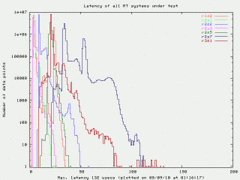Quality assessment of Linux real-time now online!
Seeing behind the curtain ...
We have just created a direct link from one of the OSADL testing labs to the OSADL Web server. This makes it possible to continuously display the current state of the Linux real-time kernel quality assessment on the Web. The data presented include
- an overview of the processors under test on this page
- continuously monitored worst-case wakeup latency on this page
- system profiles with hardware and kernel data on this page
- latency histograms of every system and combined into a single plot such as exemplified in the above figure (display at higher resolution)
The continuously monitored worst-case wakeup latency is based on the latency histograms that are part of the real-time kernel (configuration items WAKEUP_LATENCY_HIST and MISSED_TIMER_OFFSETS_HIST). The displayed latency includes a possible offset due to a timer latency plus the scheduling latency. As an advantage of this method, the apparent latency of every single wakeup procedure of every real-time process of the system is registered; in consequence, every possible deadline miss would be discovered. The penalty of enabling these histograms normally is less than 1%.
The latency plots are generated twice a day using 100 million cycles of cyclictest with an interval of 200 µs requiring about 5.5 hours to run. A system load is generated by concurrent stress programs. Note that a small number of systems run a non-RT kernel and that the latency scale is larger in combined plots where non-RT systems are included (200 µs in RT plots vs. 2,000 µs in non-RT plots).
The system profiles are generated automatically and updated to always reflect the current situation of the system under test.
A PREEMPT_RT real-time kernel patch is not released as "Latest Stable", unless all systems under test are, in fact, stable and in no case is the worst-case latency significantly longer than in the previously released "Latest Stable".





